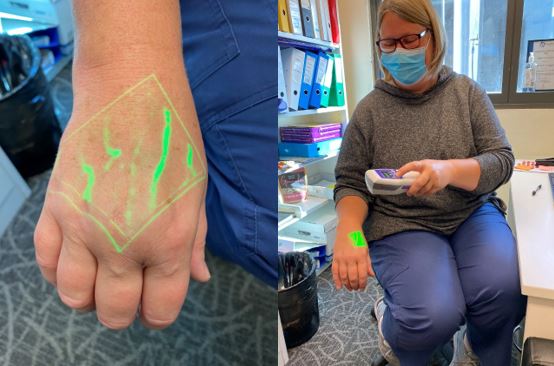Thanks to a generous donor – Accuvein for Chemotherapy Day Unit

Thanks to one of our very generous regular donors, we have received an AccuVein for our Chemotherapy Day Unit (CDU). AccuVein is a vein visualisation system that displays a real-time image of veins near the surface of the skin.
Rachel Hodges, Nurse Unit Manager - Day Oncology, explains why the AccuVein is so useful for Day Oncology patients and staff.
“For us, the AccuVein is really good for finding peripheral veins where somebody's got poor IV access. IV access is required when a patient needs a cannula for an infusion. The AccuVein won’t show large, deep veins, but rather surface veins which are more commonly used for IV infusions in the CDU. Typically, cannulas are inserted in the hand or forearm, and the AccuVein will show veins that a nurse may not be able to see with the naked eye, or be able to see where the vein goes.”
“The cannulas used in the CDU for IV infusions are fairly small, but what we need to know is if the vein is long enough to track up the needle inside the vein. It’s very useful for people with poor IV access, and as treatment progresses, IV access can deteriorate – from the treatment itself and the repeated insertion of cannulas.”
For patients that are going to be on long-term treatment, the use of Central Venous Access Devices (CVADs), such as Infusor Ports are considered, as repeated IV access can be challenging. However, CVADs do bring a different set of risks to patients, including the potential of infection and blood clots –it’s a matter of working out the pros and cons.
For shorter-term chemotherapy treatments, IV access is, generally, all that is needed. Patients may need treatment for a defined period of time so IV access is generally the preferred option where possible .
The AccuVein has uses in other medical settings as well. In the Medical Day Unit, a lot of patients have regular ongoing immunotherapies for non-cancer related conditions. These patient groups often have the same issues with IV access.
The AccuVein uses near-infrared (NIR) light and a low-power Class 1 laser to display a real-time image of superficial veins. They highlight as a bright green image projection. It works for adults and children and all skin tones. However, it will not penetrate tattoos – the veins are not visible through the tattoo pigment, so the AccuVein is not as useful in this setting.
While there isn’t any formal data to date regarding the use of the AccuVein, anecdotally, Rachel believes there has been a reduction in the number of failed cannulation attempts to achieve IV access.
Reducing the number of cannulation attempts has several flow-on advantages:
- It can reduce the physical trauma to a patient’s veins and reduce the psychological stress for patients, particularly those who know they have poor IV access.
- It reduces the costs of cannulation equipment
- It reduces stress for our staff when they have to help a patient with poor IV access.
- Increases the efficiency of nursing staff and allows them more time to assess and reassure the patient, rather than spending time on gaining IV access.
On behalf of all the staff at the CDU, Rachel would like to thank the donor for their generosity.
“I know it is an expensive piece of technical equipment, but it really does have an impact. It has been amazing for our patients and our staff. We are so thankful for their generosity – it is genuinely worth having in our department.”

